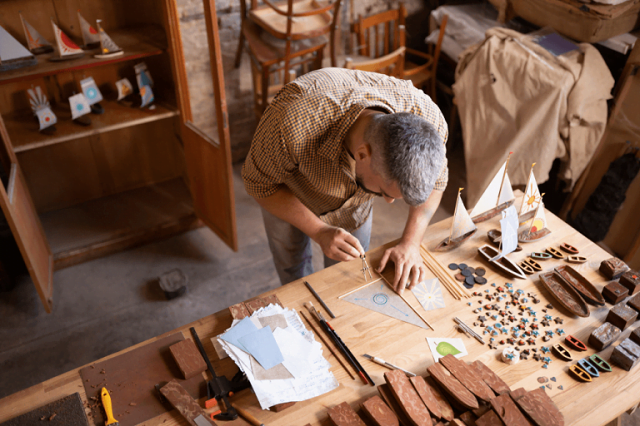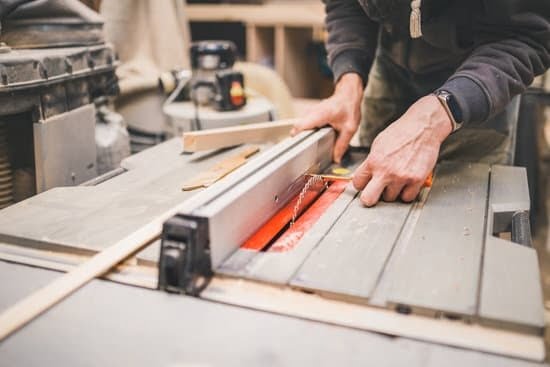Are you looking for a new hobby? Woodworking might be the perfect choice for you. Whether you are a beginner or an experienced woodworker, there are many benefits to exploring this creative and rewarding craft. In this article, we will delve into the world of woodworking as a hobby and discuss its numerous advantages. So, is woodworking a good hobby? Let’s find out.
Woodworking is not just about creating beautiful and functional pieces out of wood; it also has the potential to improve mental health and unleash creativity. From learning new skills to experiencing the satisfaction of creating something with your own hands, woodworking offers a range of benefits that can positively impact your overall well-being.
In addition to the mental health benefits, woodworking also provides an opportunity for learning and skill development. Whether you are interested in carving, joinery, or woodturning, there is always something new to explore and master in the world of woodworking. The sense of accomplishment that comes with acquiring new skills can be incredibly fulfilling and rewarding. And let’s not forget about the physical health benefits – woodworking can be a great form of exercise as well.
Benefits of Woodworking
Woodworking is a good hobby for a variety of reasons, including its positive impact on mental health and creativity. Engaging in woodworking allows individuals to focus and concentrate on the task at hand, which can provide a sense of accomplishment and relaxation. The meditative nature of woodworking can also help reduce stress and anxiety, promoting overall mental well-being.
In addition to its mental health benefits, woodworking also offers opportunities for creative expression. Whether it’s designing a new piece or experimenting with different techniques and finishes, woodworking allows hobbyists to explore their artistic side while working with their hands. This combination of problem-solving and creativity can lead to a greater sense of fulfillment and satisfaction in the hobby.
Research has shown that engaging in creative activities like woodworking can stimulate the brain and improve cognitive function. These cognitive benefits not only enhance overall mental sharpness but also contribute to a sense of personal achievement, making it clear why woodworking is considered such a satisfying hobby by many enthusiasts.
| Benefit | Detail |
|---|---|
| Mental Health Improvement | Woodworking provides relaxation and stress reduction through focus and concentration. |
| Creativity Enhancement | Woodworking offers opportunities for artistic expression and problem-solving, stimulating cognitive function. |
Learning and Skill Development
Woodworking is a good hobby for many reasons, and learning new skills is certainly one of them. The satisfaction that comes with mastering a new woodworking technique or completing a project you never thought you could accomplish is incomparable.
Whether it’s learning how to carve intricate designs, construct furniture from scratch, or simply perfecting the art of sanding and finishing, there is always something new to learn in the world of woodworking. This constant learning process can be incredibly fulfilling and rewarding for hobbyists of all skill levels.
As individuals develop their woodworking skills, they not only gain a sense of accomplishment but also improve their problem-solving abilities and attention to detail. These skills are transferable to other areas of life and can have a positive impact on personal and professional development. Additionally, woodworking as a hobby encourages continuous improvement, as there is always room to refine and expand upon existing skills.
Furthermore, the act of learning new skills in woodworking can also lead to increased confidence and self-esteem. As individuals tackle more challenging projects or master complex techniques, they gain a sense of empowerment that positively impacts their overall well-being. The process of learning new skills in woodworking provides a valuable opportunity for personal growth and self-discovery.
| Benefits | Details |
|---|---|
| Mental Health Improvement | Woodworking provides an outlet for creativity and focus which can reduce stress and anxiety. |
| Creativity Enhancement | Learn how to translate ideas into tangible objects through hands-on practice. |
| Skill Development | Master new techniques while refining problem-solving abilities and attention to detail. |
Physical Health Benefits
Woodworking is not only a great way to express creativity and improve mental health, but it also provides physical health benefits. Engaging in woodworking involves a lot of physical activity, including lifting heavy materials, standing for extended periods, and using hand tools to shape and carve wood. These activities can help improve strength, flexibility, and cardiovascular health.
Strength and Endurance
Working with wood often requires lifting and moving heavy pieces of lumber or equipment. Whether it’s carrying lumber from the store to your workshop or maneuvering large pieces of wood during a project, woodworking can help build upper body strength and improve endurance.
Fine Motor Skills
Woodworking involves intricate tasks that require precision and dexterity. Using hand tools such as chisels, planes, and saws improves fine motor skills and hand-eye coordination. This is especially beneficial for individuals who may be looking to maintain or enhance their fine motor skills as they age.
Cardiovascular Health
While woodworking may not seem like traditional cardiovascular exercise, the physical activity involved in tasks such as sanding, sawing, and planing can raise the heart rate and provide a moderate form of aerobic exercise. Additionally, the repetitive nature of some woodworking tasks can help improve circulation.
Incorporating woodworking into your hobbies not only allows you to unleash your creativity but also keeps you physically active. The combination of mental stimulation from designing projects and physical exertion from working with wood makes woodworking a well-rounded hobby that contributes to overall well-being.
Financial Aspects
Woodworking can be not only a fulfilling and enjoyable pastime, but it also has the potential to be a lucrative venture. Many people have discovered that turning their hobby into a small business can be a great way to earn extra income or even make a living.
Whether selling at craft fairs, online marketplaces, or local shops, there is a demand for high-quality handmade wood items. From furniture and home décor to unique gifts and accessories, the possibilities for creating and selling woodworking projects are endless.
One of the advantages of selling handmade woodworking items is the ability to set your own prices based on the time, effort, and materials put into each piece. This allows woodworkers to not only cover costs but also make a profit from their creations. Additionally, customers often appreciate the craftsmanship and uniqueness of handmade goods, making them willing to pay more for these items compared to mass-produced alternatives.
Another benefit of selling handmade woodworking items is the satisfaction of knowing that your creations are being enjoyed by others. Whether it’s seeing someone purchase your work at a market or receiving positive feedback from happy customers, knowing that your craftsmanship is appreciated can be incredibly rewarding. For many woodworkers, this sense of validation is just as valuable as the financial aspect of selling their pieces.
Community and Connection
Woodworking is not just a solitary hobby, but also a great way to connect with others who share the same passion. The woodworking community is filled with individuals who are always willing to share their knowledge, tips, and tricks with newcomers. Whether it’s through online forums, social media groups, or in-person woodworking clubs, there are plenty of opportunities to connect with like-minded individuals and learn from their experiences.
Here are some ways in which woodworkers can connect with each other:
- Woodworking clubs and associations: Joining a local woodworking club or association can provide a sense of camaraderie and support. Members often participate in group projects, workshops, and meetings where they can exchange ideas and gain inspiration from each other.
- Online communities: There are numerous online forums, social media groups, and websites dedicated to woodworking where enthusiasts can seek advice, share their projects, and engage in discussions with fellow woodworkers from around the world.
- Woodworking events and shows: Attending woodworking events, trade shows, or exhibitions is a great way to meet other enthusiasts and professionals in the field. These events often feature demonstrations, seminars, and networking opportunities.
Being part of the woodworking community not only provides a sense of belonging but also encourages continuous learning and improvement. By connecting with others who are passionate about this craft, woodworkers can expand their knowledge base, receive valuable feedback on their projects, and form lasting friendships with like-minded individuals who appreciate the artistry of working with wood.
Safety Precautions
Woodworking can be an incredibly rewarding hobby, allowing individuals to create beautiful and functional pieces with their own hands. However, it is important to emphasize the significance of safety when engaging in woodworking activities. Implementing proper safety precautions is crucial to prevent accidents and injuries that could potentially occur while working with sharp tools and heavy machinery.
Personal Protective Equipment
One of the most important safety precautions in woodworking is wearing appropriate personal protective equipment (PPE). This includes items such as safety goggles to protect the eyes from flying wood chips, a dust mask to prevent inhalation of wood dust, and ear protection if using loud power tools. Additionally, wearing fitted clothing and sturdy closed-toe shoes can help minimize the risk of injury.
Tool Maintenance
Regular maintenance of woodworking tools is essential for ensuring safe operation. Sharp blades and well-adjusted machinery are not only more efficient but also less likely to cause accidents. It is important to keep tools clean and properly lubricated, as well as store them in a secure location when not in use.
Workshop Organization
Maintaining a tidy and organized workspace is crucial for preventing accidents. By keeping the work area clear of debris and unnecessary items, woodworkers can avoid tripping hazards and easily locate tools when needed. It is also important to have a designated spot for each tool and piece of equipment to minimize the risk of misuse or mishandling.
By prioritizing safety precautions in woodworking practices, individuals can fully enjoy this hobby without compromising their well-being. Whether working with hand tools or power equipment, it is essential to continuously educate oneself on best safety practices to prevent potential harm while pursuing this fulfilling craft.
Getting Started
Woodworking is a popular hobby that allows individuals to create beautiful and functional items out of wood. Whether you’re interested in making furniture, small crafts, or even intricate carvings, woodworking offers a wide range of possibilities for creativity. If you’re considering taking up woodworking as a hobby, there are some tips for beginners and resources for learning woodworking techniques that can help you get started on the right foot.
Here are some tips for beginners:
- Start with simple projects: Begin with small, manageable projects that will allow you to learn basic skills and gain confidence.
- Invest in quality tools: While it’s important to start with a few essential tools, investing in quality equipment can make a significant impact on the outcome of your projects.
- Learn from experienced woodworkers: Consider taking woodworking classes or workshops to learn from experienced professionals who can provide valuable guidance and instruction.
In addition to these tips, there are also numerous resources available for learning woodworking techniques. Online tutorials, books, and instructional videos can all provide valuable information for those getting started in woodworking. Many local community centers and maker spaces also offer classes and workshops for beginners.
Whether you’re interested in traditional hand tool woodworking or modern power tool techniques, there are plenty of resources to help guide you as you develop your skills. As you continue to practice and learn, you’ll find that woodworking is not only a fulfilling creative outlet but also an excellent way to challenge yourself and expand your abilities.
Overall, getting started in woodworking as a hobby can be an exciting journey filled with learning opportunities and the potential for creating beautiful pieces. With the right guidance and resources, beginners can find immense satisfaction in exploring this timeless craft.
Conclusion
In conclusion, it is evident that woodworking is indeed a good hobby for a multitude of reasons. From its positive impact on mental health and creativity to the physical health benefits of engaging in a hands-on activity, woodworking offers a well-rounded experience for enthusiasts.
The satisfaction of learning new skills and the potential for selling handmade items for profit add an additional layer of reward to this hobby. Furthermore, the sense of community among woodworkers provides a supportive and connected environment for individuals to share their passion and knowledge.
When considering whether woodworking is a good hobby, it’s important to highlight the safety precautions that must be taken seriously. While woodworking can be incredibly rewarding, it also requires careful attention to detail and adherence to safety measures in order to prevent accidents and injuries. By prioritizing safety and using proper equipment, woodworkers can fully enjoy this fulfilling hobby without unnecessary risk.
For those who are interested in getting started with woodworking as a hobby, there are countless resources available for learning techniques and tips for beginners. Whether through online tutorials, workshops, or joining local woodworking groups, there are plenty of opportunities to explore this craft and develop the necessary skills.
Ultimately, woodworking offers not only a creative outlet but also a sense of accomplishment that comes with creating one-of-a-kind pieces from scratch. All things considered, it’s clear that woodworking is not just a good hobby – it’s an enriching and highly rewarding one as well.
Frequently Asked Questions
Is Woodworking a Fun Hobby?
Woodworking can be a very fun hobby for those who enjoy working with their hands and creating tangible objects. It’s satisfying to see the end result of your hard work and creativity.
Is Woodworking an Expensive Hobby?
While woodworking can be expensive, especially when purchasing tools and materials, it doesn’t have to break the bank. There are budget-friendly options for beginners, and as skills improve, investment in quality tools becomes more justifiable.
Is Woodworking Good for the Brain?
Yes, woodworking is good for the brain in many ways. It requires problem-solving skills, spatial reasoning, and attention to detail. It also provides a creative outlet that can reduce stress and improve mental well-being.

Hi everyone! I’m a woodworker and blogger, and this is my woodworking blog. In my blog, I share tips and tricks for woodworkers of all skill levels, as well as project ideas that you can try yourself.





